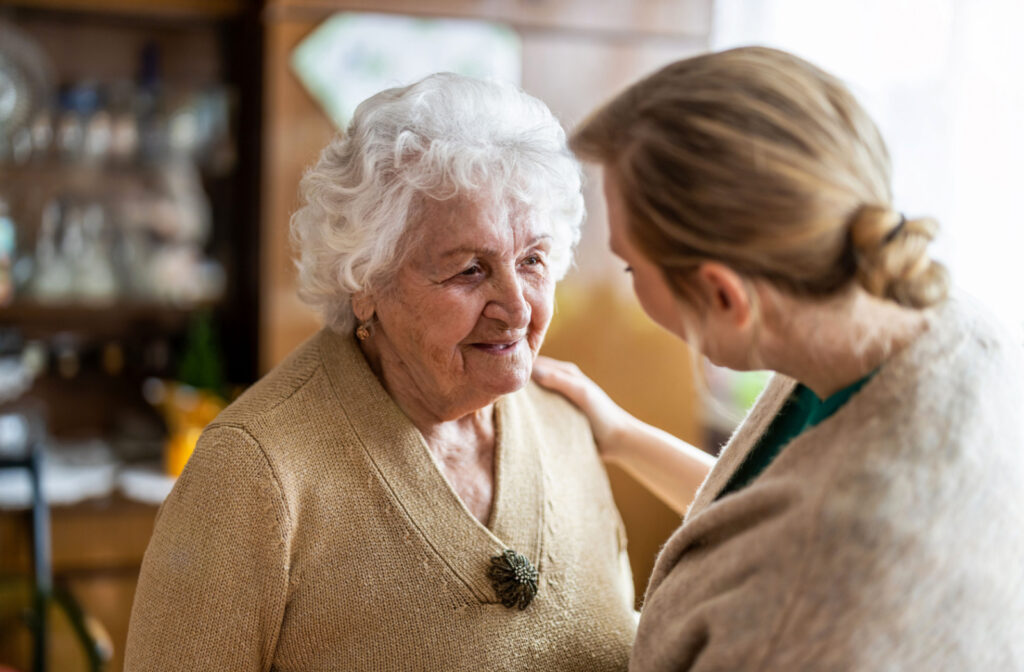Aging is an inevitable part of life. As we get older, our bodies start to change, and we become more susceptible to certain health conditions. However, this doesn’t mean that you can’t stay healthy and active well into your golden years.
By being aware of the most common health concerns in older adults, you can take proactive steps to manage them and enjoy a happy, healthy life. Some of the most common health concerns in older adults include:
- Arthritis
- Falls and accidents
- Chronic diseases
- Mental health conditions
- Memory loss
When these common health concerns become too much for you and your loved ones to handle, there are options for support, too, such as assisted living, memory care, and respite care,
The Legacy at South Plains tailors services to meet individual needs and preferences. Whether you want everyday support or more specialized care for cognitive concerns, our dedicated staff will work to help you live a joyous and dignified life.
Arthritis
Arthritis can cause swelling and discomfort in your joints. There are over 100 types of arthritis, but osteoarthritis is one that often affects older adults—it usually shows up after people are 50 years old.
Rheumatoid arthritis is another common type that can show up earlier. It’s a form of autoimmune disease that can affect people at any age, but your risk of developing it can increase as you get older.
What Causes Arthritis?
There are several factors that can cause arthritis, including:
- Gradual wear on your joints
- Injuries
- Obesity
- Autoimmune diseases
- Muscle weakness
- Genetics (a family history of arthritis)
When you experience stiffness or pain in your joints, doctors can perform exams and scans, take blood samples, and check out your joint fluid to help you get a clear diagnosis.
How Is Arthritis Treated?
Treatments can range from pills and creams to therapies, mobility training, and surgery when necessary. Doctors may also recommend lifestyle changes like adding certain nutrients to your diet or pursuing weight loss goals.
It’s important to speak with a doctor about your symptoms and which form of treatment may be right for you.
Falls & Accidents
Falls can be serious for older adults. A simple slip could lead to broken bones and other serious complications.
Staying active can help older adults reduce their risk of falls–it helps keep their muscles strong and their balance sharp. Wearing the right shoes is also important. And, of course, living in an environment with clear pathways to move around and support for preventing falls can go a long way in preventing unexpected trips and stumbles.
Chronic Diseases
As you get older, the risk of developing chronic diseases like diabetes and heart disease can rise. But here’s the good news: staying active can really help. A little exercise can go a long way in keeping those risks down.
Staying on top of fitness and nutrition can help ward off a lot of age-related ailments. Keeping your muscles strong and maintaining a healthy weight can be the key to avoiding conditions like cardiovascular disease.
Exercise can be especially important for people with diabetes because it helps manage blood sugar levels and reduce the risk of heart disease. For all older adults in general, moving around can be essential for avoiding common age-related diseases and conditions.
Mental Health Conditions
Maintaining a strong support network and being proactive about mental health can be essential for maintaining your quality of life as you get older. Factors such as isolation, bereavement, and chronic physical conditions can increase the likelihood of mental health challenges for many older people, including depression and anxiety.
The value of social connections and engaging in meaningful activities cannot be overstated. These elements can play a critical role in safeguarding the emotional well-being of older adults. For instance, relationships with friends and family, as well as participating in enjoyable hobbies, can serve as protective factors against mental health issues.
It can be imperative for older adults experiencing mental health concerns to seek support. Professional help for mental health can improve a person’s quality of life, and there are many resources available to help support mental health for older adults.
Memory Loss
Memory loss can be a bit of a concern as we age, but there are things you can do to help keep your brain in good shape. Getting some exercise can be great for memory sharpness and reducing your risk of cognitive decline.
Also, giving your brain a workout, getting good sleep, and eating well can help prevent cognitive decline. Your brain health is closely linked to your overall health.

Navigating the Health Challenges Faced by Seniors
While aging may present certain challenges, it is still possible to maintain good health and lead an active and enjoyable life as an older adult.
By understanding and addressing common health concerns, older adults can take proactive steps towards protecting their physical and mental health, staying independent, and enjoying a high quality of life for years to come.
Don’t let age slow you down—stay informed, stay healthy, and enjoy all that life has to offer! The Legacy at South Plains is here to help! We encourage you to book a tour and see what we have to offer.


